|
Port Everglades: January 20th, 2007
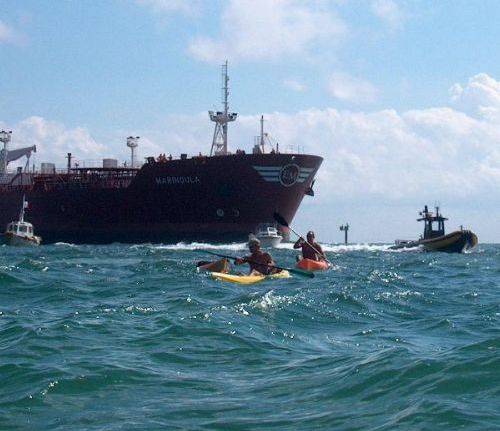
Captioned: A kayaker just rescued from the jaws of death by Sea Tow!
Two more paddle franticly to escape.
What Happened
Recently I'd heard through the watervine about a near disaster in Port Everglades. If you are not aware there's a local guy who has been organizing and promoting kayak outings, rents a few kayaks to the participants.
He'd promoted a short excursion headin out the PE inlet and back - attended by maybe 6 or 8 kayakers, many new. When I first heard of this proposed trip I was pretty surprised as the inlet is NO place for anyone less than experienced paddlers who are up to date on self and assisted rescues. Apart from very high currents, standing waves, and wind tunnel effect you also have to deal with very large, very fast cruisers throwing humongous wakes. Plus the nasty cross chop that is common here.
Well, they went, and my worst fears were realized.
An older paddler in an open SIK - toward the MIDDLE of the channel yet (!) - got hit by some cross wakes - went over and could not reenter, his mates helpless to rescue him - was stuck right in traffic.
It gets worse.
A couple tugs and a pilot boat were accompanying a large freighter - unstoppable - and sounded 5 horns (emergency). This gentleman was staring up at a possible and untimely death. Fortunately help was at hand. A Sea Tow boat saw what was happening and zoomed over, scooped the weary and scared paddler and accelerated out of harm's way in the nick.
The Anatomy of Disaster
This was a terrible situation, and one that needn't have ever happened. After a discussion with a guide friend of mine we both concluded that the organizer - who is experienced - was remiss in allowing relative newbies to attempt a risky passage. Why did this happen?
First , there is the element of fun. People think of the fun and not of the danger. Man, this will be cool!
Second, the Jackass factor. It may look dangerous, maybe even IS a little dangerous, but it'll be fun (factor one)! Man, will this be cool!
Third, is ignorance. Newbies especially are not aware of the risks they are taking. Man, this will be cool!
Last, it's hard for me not to level some criticism of the organizer who should have known better. Newbies should not have been allowed to attend. Yakkers should have been warned to in line and close to the seawall, far away from the main channel. Rescues, if attempted, were unsuccessful.
Man, this was NOT cool!
Although promoted on a casual "meet-up" site, the organizer is indeed running a business, renting kayaks, guiding groups of frequently newer or inexperienced kayakers, sometimes several times a day, charging $30 for kayak rental. This implies both responsibility and liability.
Now you're probably wondering, what did the poor partipants think of all this?
The Participants Respond
|
"What an adventure!"
"Honestly I can't stop laughing! The tug boats screaming at us to get out of the way, Jack and his sandals and don't forget him walking around secruity department..."
"Deet. Doot. Deet. Doot... Another uneventful day in the kayak. NOT!!!"
And from the surprised organizer: "Our most adventurous trip yet but not for the reasons I expected... water conditions were pretty calm but one person flipping at the worst place sent this event into a totally different direction... "
Only one participant spoke with real gravity and understanding: "I do think our little adventure is a good example as to how quickly things can go wrong out on the water. Sometimes we can get a bit complacent about what it really takes to be safe when venturing out onto the ocean in our tiny vessels. Lets all remember to check our list of equipment, make sure we are competent to use them. It is also important to include an honest assesment of our skill level and be sure not to push beyond our personal limits."
|
"Honestly, I couldn't stop laughing..". Can you believe it?!
Most of the participants seem to have taken this as a big joke, still don't realize the seriousness and the danger they were in. The organizer seemed surprised as "...the waters were pretty calm". Really? It's too bad the sole reasonable participant was not in charge, as...
This trip would never have been undertaken. Newbies in particular are at great risk, often don't know it and place a great deal of confidence in the organizer. If the organizer doesn't have it together, then what can happen is what DID happen.
Aside: the above was largely published at the forum. It was not long before I received a coupla emails, one from the organizer (kicking me off his meet-up list) and also from the victim (more later).
More Anatomy - da Leg Bone's connected to the Foot Bone
And the foot bone is buried in, well, let's see:
It seems the day started well. Nice sunny day, relatively calm (except in the Port), great day for yakkin.

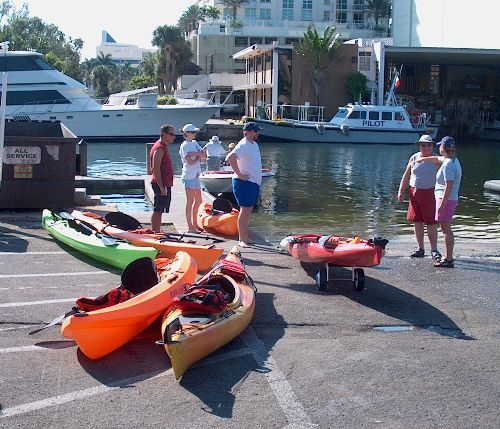
Mostly rec yaks and a large, open-cockpit SIK (unskirted and unfit for rough conditions). Note the nice PFD strapped onto it's stern. The organizer later claimed: "We reviewed the necessary safety issues prior to launching AND discussed modifying the planned route based on water conditions and our own skill comfort levels". Did he? Let's continue.
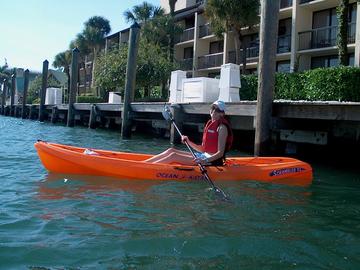
Some wore their PFD's...
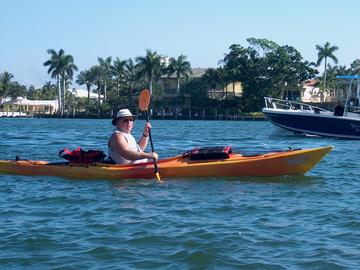 And some didn't! And some didn't!
This is the victim. Makes me wonder, just what "safety issues" were discussed?
It started well, with the organizer in the lead, group following closely in a rough line...
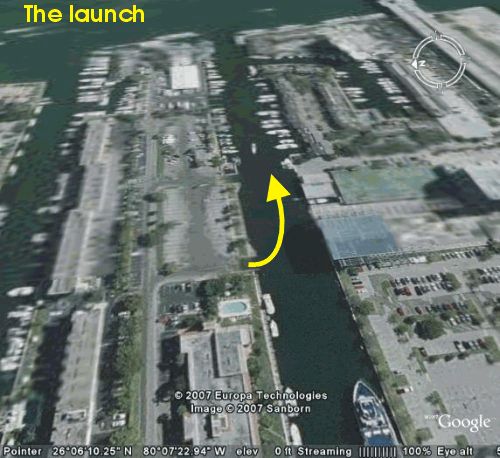
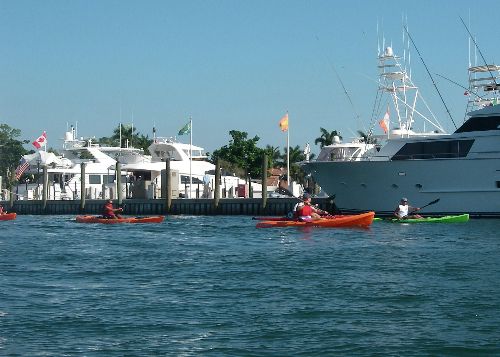
Sticking close to the east wall, the group made it to the corner beach at the intersection of the ICW and the often volatile inlet...
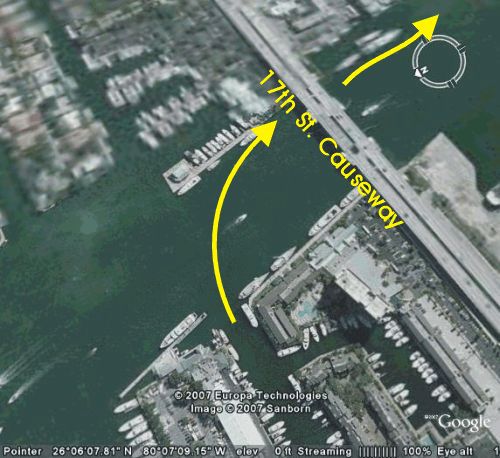
Calm and idyllic here, the group was surely lulled into the peace and beauty of the moment. But wait till you see this beach later!
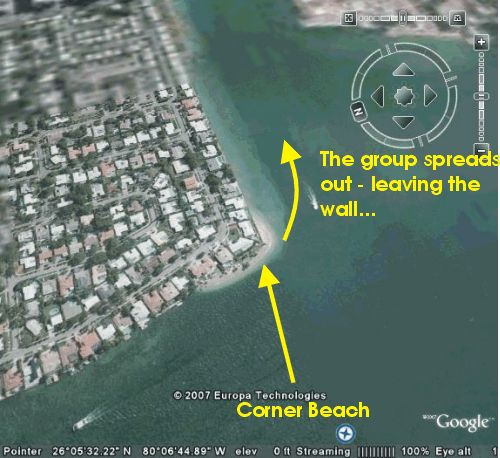
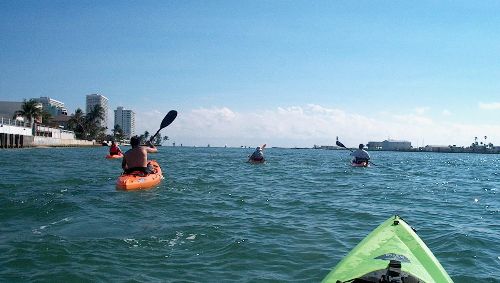
Lulled and excited, the group heads east out the inlet. The tight line organization is now history, and if most were wearing PFD's before, they sure aren't now - and nobody seems to care. The organizer is now in the middle of a loose group. Already the group members are spread out far out from the relative safety of the seawall and edging into a high speed traffic zone. Not good.
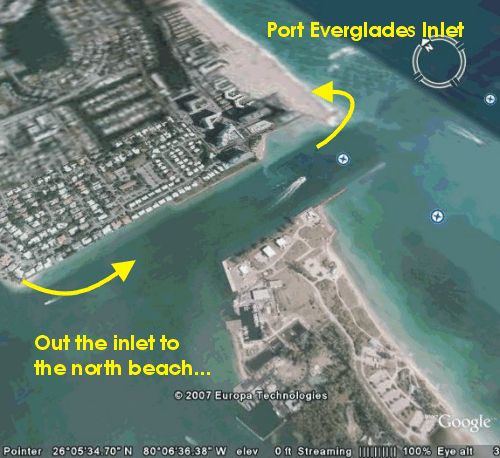
Still, they arrive without incident...
No doubt unaware of their good fortune, the group celebrates their arrival at their destination, the ocean beach just north of the inlet. Despite bad habits and risky practices employed, they successfully made their destination, all mistakes duly reinforced.
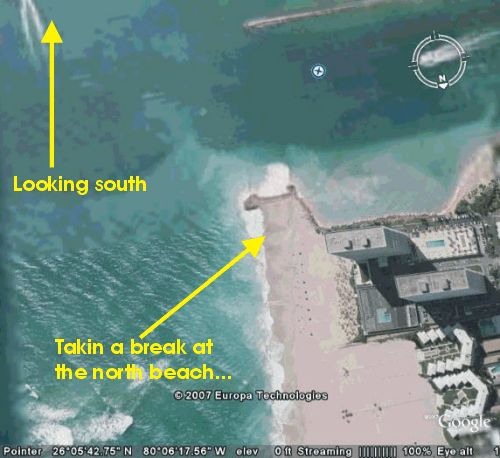
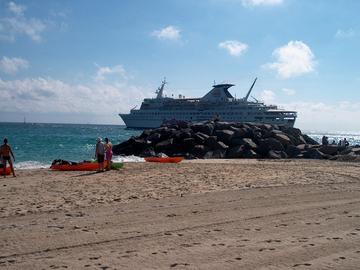
A passing liner shoulda been a hint of things to come. As most of us know, these behemoths move fast, create dangerous turbulence and suction, and leave the inlet in a froth of extremely big, violent cross chop and multiple reflections. Did they heed this portent of things to come?
Apparently not. This next pic tells all...
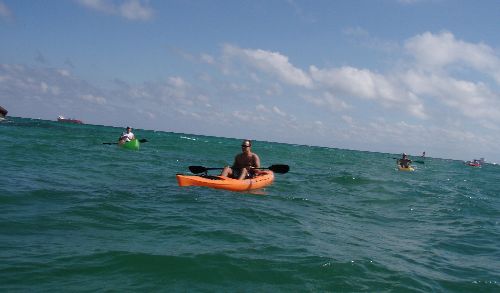
This is an eastward view looking out the inlet. The group is now glowing in their great day on the water, probably overconfident. PFD's are a thing of the past for most. They are well out from the protective north seawall to which they should be hugging (to the far left). The victim is off to the far right and rear, barely visible, almost off the picture.
Worse by far is the freighter traffic. One has apparently left (or is anchored) and is heading out (left of pic). Another freighter is rapidly INCOMING and for the moment, is barely visible in the top right. Timing and position is everything in making the inlet, and this group exhibits neither.
They should have waited for a clear opening, and then moved fast in a single line, tight formation, out of the channel and much closer to the protective seawall (to the left). And worn their PFD's!
Actually this picture was taken just moments before the near fatal capsize. All the elements are now in place.
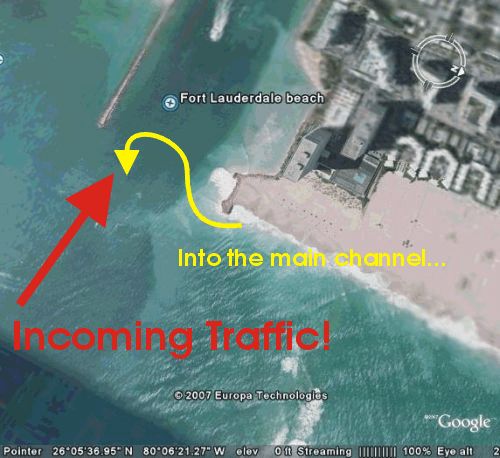
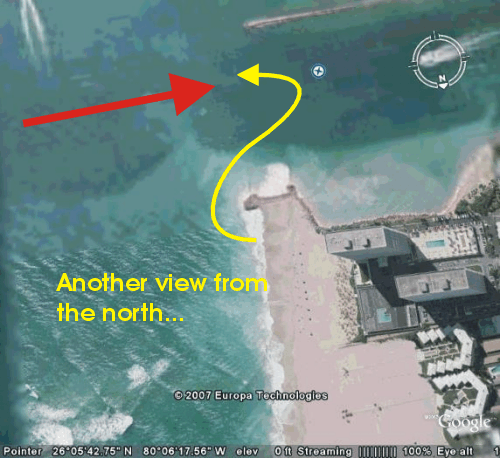
First, the victim. Although he believes himself "experienced" he is paddling in very rough and turbulent conditions. He is in a shorter SIK with an uncovered, very large open cockpit. No skirt. He is not wearing his PFD, and apparently never did. He has strayed from the group and is well in the channel. What more could go wrong? Is he really as "experienced" as he claims?
No. He capsizes and although "experienced", is unable to reenter his kayak, even with help. He is unable to retrieve his PFD and put it on. It is reported he became exhausted and could do little more than hang on to a helping kayak. Does it get worse? Sure does...
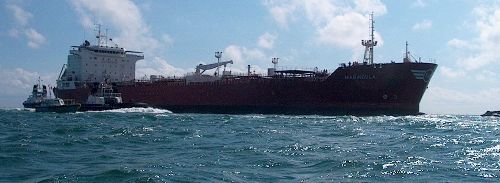
This is moving death. The large freighter which seemed so safely distant is now impending, and accompanied by at least two tugs and a pilot boat. And it can't be easily stopped or turned!
To be blunt, this is as close to death as any of us might ever face.
Except for this: A Sea Tow boat. With tugs sounding five horns (emergency), several very scared kayakers, and the exhausted victim in the water - these guys zoomed to the rescue.
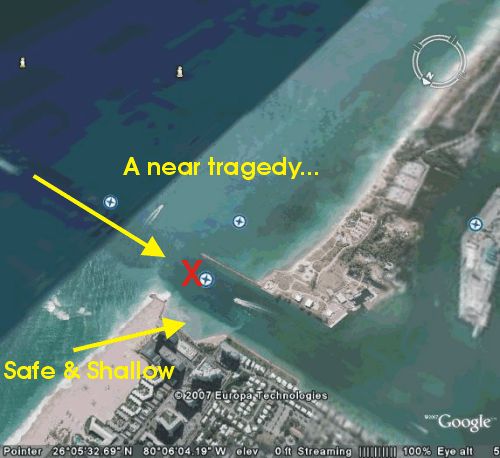
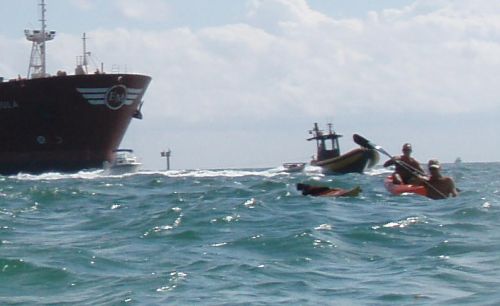
Acting quickly and with complete professionalism in turbulent waters, the Sea Tow crew quickly and safely scooped the victim, and sped out of the freighter's path. Another minute, and only the gods and Neptune know what disaster was in store.
The two remaining kayakers, one towing a VERY heavy and waterfilled empty kayak, desperately paddle out of the way.
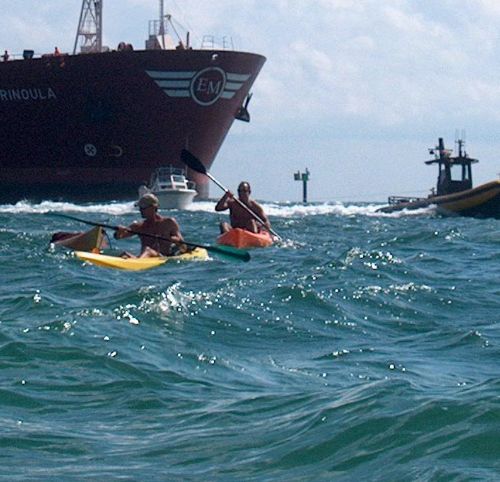
This is amazing! The small motorboat just in front of the incoming tanker is under tow by the tow boat. Captain John Estey not only saved the exhausted kayaker, he did so with a boat and passengers in tow. This was an amazing feat.
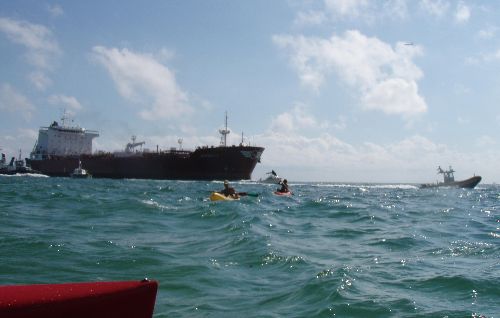
With great effort they finally make it in. Towing a filled kayak or swimmer is like towing a dragging anchor. It's HARD and exhausting, even for short distances. Believe me, having had to once tow an empty kayak and a swimmer to safety, I know.
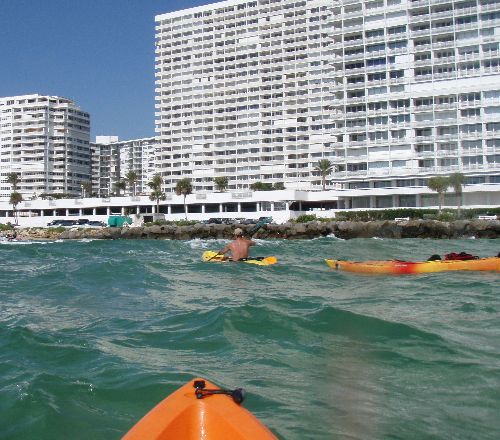
Take a look above - looks like the victim's PFD remained right where he left it - bungied to his open cockpit SIK! And whatever happened to that calm, idyllic beach?
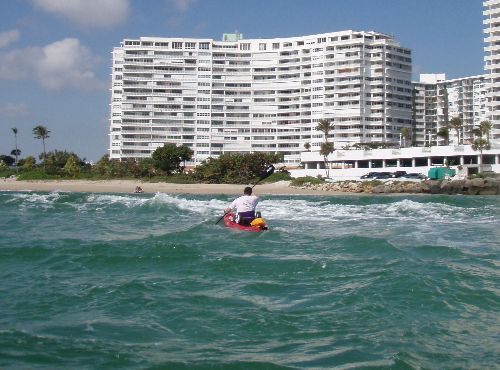
After a bit of the usual inlet traffic, it can easily become a wild surf zone. Honest, it's the most dangerous and challenging passage in Fort Lauderdale.
How quickly things change!
Here's how I see it:
1. The organizer carries a major responsibility. Although he promotes what is surely a business on a simple "meet-up" website, a business it is. He named and runs his own "meet-up" group, plans and promotes interesting events, rents kayaks and leads group tours. This almost insures that a lot of newbies will attend. Few of these would ever consider doing the inlet without the encouragement and leadership of the organizer.
This was NOT an event for any but the very most experienced kayakers - wholly unsuitable for many of those allowed to participate.
2. If he did, as claimed, "discuss the necessary safety issues" it was not apparent. On their reentry through the inlet, I counted at least four kayakers (including the organizer!) who were not wearing their lifevests. The erstwhile victim did not wear his lifevest at all times, and not at the time of capsize. This in what are clearly the most dangerous waters in Ft. Lauderdale.
This was dangerous and irresponsible. Did the organizer lose control of the group? Did he ever have it?
3. Pictures of the event reveal that the group was spread out and was not very near the north seawall out of traffic patterns (FYI, there are no speed limits in the inlet - speedboats, Cigarettes and larger fast cruisers barrel through at very high speeds, often near the seawalls and throwing unbelievable wakes).
This was asking for trouble and not just from big freighters. Unwise and risky in many ways, and the worst possible location to capsize.
4. I find it hard to believe this organizer was in control. I really wonder what kind of "safety issues" he discussed, or emphasized. The crossing seemed loose and disorganized. By not wearing a PFD himself, he set a very bad example.
5. Neither the "experienced" victim - nor the organizer - nor his fellow paddlers were prepared or able to complete a successful reentry and rescue. They could do little more than observe their own fate. The victim was completely exhausted and without his PFD. With an impending, unstoppable freighter looming, the victim seemed SOL. Good grief!
6. Thank the gods for the quick thinking and professional crew of the Sea Tow boat. I call this true heroism.
All in all, this whole affair was an accident waiting to happen, and that it did. That a horrible tragedy did not occur was simply a miracle.
A Sequel: The Reactions of the Participants
The organizer: "By the way...
our group WILL have another paddle trip through the inlet again."
Ouch! Stubborn. You would think that after an incident of such gravity, the organizer would be greatly concerned, if not repentent. Not really...
|
The organizer:
"Am really hoping this issue fades into the past soon, but I suppose it still needs to spread through the 'paddling community' before that can happen. Understandable.
But let's not make this bigger than it needs to be, listen to rumor or exaggerated criticisms, or jump to the conclusion about what caused it.
What happened is routine... a kayaker in a cockpit yak flipped. What made it bad was that this unfortunitely happened in the worst place and time... on the north-side of the inlet at the ocean entrance.
This could've happened to anyone. Am sure we've all paddled someplace, even if for a matter of moments, that flipping could've quickly led to disaster... this was one of those times.
For the record...
* Nobody was a newbie paddler on that trip, all had at least intermediate skills. The person who flipped happened to be an experienced kayaker in a stable yak; simply flipped when two or three waves caught him wrong.
* The event page was VERY clear about the potential water conditions of this trip AND requested only skilled solo paddlers capable of self-rescue; members are responsible for themselves so it's up to them to determine their skill-level.
* We reviewed the necessary safety issues prior to launching AND discussed modifying the planned route based on water conditions and our own skill comfort levels.
* The purpose of this trip was for a more challenging event, as requested by members, something different than our usual recreational ones. Nobody minimized the dangers or effort required for this paddle trip (nor on others).
* Conditions were surprisingly calm. The water in the inlet on the way out was flat and boat traffic nearly non-existant. Twenty minutes later there was the usual amount of traffic, which caused regular wake conditions... still nothing extreme. Hell, I managed to tow his yak with little trouble through the inlet.
* Rescue decisions had to be made within seconds, right or wrong. A "T-rescue" was not attempted because of the specific circumstances.
* Nobody made light of this incident afterwards, far from it. The situation had been heavy enough... none of us felt the need to make it worse later.
Were mistakes made... YES... and valuable lessons learned too. And, NO, it was not a 'text book' rescue but it was pretty damn good. It's one thing to (try to) teach the 'what to do if...' scenarios during a lesson, but another to learn from experience.
If anyone thinks us chosing to paddle through the inlet -- with it's usual choppy conditions and high boat traffic -- was irresponsible... then why do we paddle at all? Kayaking is not without risk regardless of any factors.
That should cover most questions and curiousity! I greatly appreciate everyones support in not fueling this into anything more than it already was.
There will be some group changes as a result of this, nothing major, but some increased safety and skill checks can only be a positive.
By the way... our group WILL have another paddle trip through the inlet again."
|
How sad. The organizer seems relatively unfazed and unapologetic about this near tragedy. Let's parse his response...
"let's not make this bigger than it needs to be..."
I'm not sure how much "bigger" things need to get, or possibly could get. I think a near death is quite serious enough.
"What happened is routine... What made it bad was that this unfortunitely happened in the worst place and time"
This incident was anything but routine. The organizer is implying that "things just happen" and just happened to occur in a bad location. Fact is, these kayakers had NO business being anywhere but close to the seawall, being without PFD's, or being in an open cockpit SIK kayak that was completely unsuitable for the conditions.
"This could've happened to anyone..."
Another "just one of those things" type of answer that takes no responsibility for allowing inexperienced kayakers to attempt a passage for which they were neither prepared or competent.
"Nobody was a newbie paddler... all had at least intermediate skills... The person who flipped happened to be an experienced kayaker in a stable yak""
I'm shocked. If the organizer doesn't recognize the danger and unseaworthiness of an large open cockpit rec yak in the Port, well I'm simply speechless. And no newbies? Let's review the skill levels, shall we?
|
Regarding Paddling Experience
Paddler 1: "I've done a bit of kayaking in a few places and a few times in s. florida." Newbie.
Paddler 2: No answer given. Probable newbie.
Paddler 3: "Took a paddling lesson in April and have been kayaking almost every weekend ever since. I go to W Lake, Olita, and Pennekamp. I now have an Ocean Classic Scrambler sit on top and a car rack." Some experience inland in flat water, but none in ocean conditions, especially the inlet. The Scrambler is a marginal design, with a relatively high COG.
Paddler 4: No answer given. Probable newbie.
Paddler 5: "None yet, but looking forward to the challenge." Newbie
Paddler 6: "I have been kayaking for about 5 years... I have been on the Potomac in Washington, DC, Shenandoa River in Va all around different creeks and lakes on #1 and 2 rapids..." This is the kayaker the organizer refers to as "experienced", but who also was not wearing his PFD, was driving a wholly unsuitable open cockpit kayak, who could not achieve a reentry (even with assistance), and who strayed into rough traffic patterns. Experienced?
Paddler 7: "Have owned an ocean Kayak since 2000 I like going out and snorkling on the reefs off of Hollywood beach" This was the only kayaker other than the organizer who might truly be considered intermediate. He has ocean experience, and is an experienced diver. Still, he did not wear his PFD during this passage. He was the only kayaker of the entire group who recognized the gravity and responsibilities of this incident.
The Organizer: "Am an active paddler and always looking for buddies to venture out with. Prefer sit-on-top kayaks and ocean paddling, but waterways are great too." Claims ocean experience and drives a good, seaworthy kayak. Let's take him at his word as experienced. But not enough to cancel this trip, exclude newbies, control the group, mandate PFD's, or to complete a rescue.
|
Maybe my standards are different but by my count: only one allegedly experienced paddler (the organizer), just one intermediate - the rest are admitted or probable newbies (with several renters). Later even one of the claimed participants admitted that "...3 were pretty new". In any event, their reckless behavior on the water speaks for itself.
"The event page was VERY clear about the potential water conditions of this trip AND requested only skilled solo paddlers capable of self-rescue..."
The organizer shades the truth here. Now the announcement did state "PLEASE NOTE: This event is marked "Intermediate/Advanced" because the water through the inlet is usually pretty choppy AND has high boat traffic. If there is any question about your endurance or solo paddling/rescue skills, then maybe this event isn't for you."
But there's a problem here. There was plenty of "question" regarding skills - there were several admitted newbies attending, several of whom did not even own kayaks. The organizer continues: "...members are responsible for themselves so it's up to them to determine their skill-level."
Sorry, but I can't buy that.
The organizer is running a business - promotes the trips, leads them, and rents the kayaks. Shrugging off any personal responsibility to inexperienced kayakers who don't know better is a bit much. Did he question the admitted and probable newbies, the renters, about their experience? Did he ask them to demonstrate competence? Did he actually read the paddling profiles they posted at his "meet-up"? With newbies in evidence, why didn't he choose an alternate route, say a nice canal paddle? Why did he allow the group to stray, and especially to NOT wear PFD's? And why did he himself fail to do so?
It's like sayin "the management of this restaurant is not responsible for any accidental poisonings of our customers... hey, they chose to eat the food!", lol.
"Conditions were surprisingly calm. The water in the inlet on the way out was flat and boat traffic nearly non-existant. Twenty minutes later there was the usual amount of traffic, which caused regular wake conditions..."
Sorry, pictures don't lie. "Surprisingly calm"?! Sheesh! You be the judge. An "experienced" kayaker was upended in "regular wake conditions"? Please. There was no such thing as "regular wake conditions" on this day in the inlet, unless by "regular" you mean a viscious, high and dangerous cross chop.
"Hell, I managed to tow his yak with little trouble through the inlet."
This appears to be untrue. Indeed, the pics show the intermediate diver-paddler, not the organizer, towing the waterlogged kayak to safety. As this kayaker (NOT the organizer) stated: "As soon as I saw that the kayaker in the drink was being helped I went back and tied the flipped and very waterlogged kayak behind my own and towed it out of harms way. Not the easiest paddle I've ever done."
The organizer continues:
"Nobody made light of this incident afterwards, far from it..."
To the contrary the participants that commented (quoted at the top) were flippant, if nervously so. The organizer downplayed the event. And I received an email from the victim, who continues to insist that he is "experienced" and simply had an unfortunate and unavoidable mishap. He appears to think that last moment rescues by professional tow boats are both common and expected.
"And, NO, it was not a 'text book' rescue but it was pretty damn good."
Actually, there was NO rescue at all by either the organizer or any fellow paddlers. Were it not for the intervention of the Sea Tow boat, the victim might well have suffered a horrible death.
"There will be some group changes as a result of this, nothing major, but some increased safety and skill checks can only be a positive."
Emphasis added. Nothing major? More downplay. This excursion, in my view, was almost completely wrong in almost every way. There is MUCH to be changed, beginning with a signficant attitude adjustment. Still, I have noted that since the dissemination of this incident, two safety events have been scheduled by the organizer. Does this signal a real change in operations of the excursions themselves - or is this just a CYA event?
"If anyone thinks us chosing to paddle through the inlet -- with it's usual choppy conditions and high boat traffic -- was irresponsible... then why do we paddle at all? Kayaking is not without risk regardless of any factors."
Choosing to proceed with a dangerous passage with improperly controlled and inexperienced paddlers IS irresponsible. And in any case, the failure to keep tight formation, leader to the rear, with PFD's on, close to the seawall, and timed to avoid heavy traffic is too.
Irresponsible. Tempting fate is NOT why we paddle. Kayaking surely has some inherent risk - it is then supremely foolish to create additional, unnecessary and avoidable risk. As paddlers, or organizers, we all have to make conservative, safe and responsible choices. Frankly, I am appalled at the level of denial exhibited to some degree by ALL of the participants.
Perhaps downplaying is a normal and protective reaction to what was a truly frightening and dangerous incident. I do hope that in time they, and we too, can all learn from this event. I leave you with the comments of the sole participant whose reaction was most nearly appropriate:
|
"All's well that ends well! This trip turned out to be just a tad more challenging than I had anticipated. The group was a great mix of really nice people. Some veterans and some slightly less experienced yakers but great sports nonetheless.
I do think our little adventure is a good example as to how quickly things can go wrong out on the water. Sometimes we can get a bit complacent about what it really takes to be safe when venturing out onto the ocean in our tiny vessels. Lets all remember to check our list of equipment, make sure we are competent to use them. It is also important to include an honest assesment of our skill level and be sure not to push beyond our personal limits.
|
One final question: was this a just simple, casual "meet-up" group that got out of control - or the predictable result of carelessness by a defacto tour operator? You decide...
Feedback from Others:
From Colleen of Full Moon Kayaks (reliable tour operator):
|
Capn Jimbo,
I appreciate your forum and so glad to see your comments about this subject...paddle safe. Everyone in the industry has a responsibility to keep our fellow paddlers safe. Mfrs., retailers, outfitters, instructors, friends....
|
From Scupper Pro Frank (experienced kayaker)
|
WHOLLY SPIT!, PADDLEMAN -CAN U BELIEVE THOSE COMMENTS...???
I read thru your little tale with an ill feeling, Jim - never been to Port Everglades, not sure if I really want to, other than to get choatic clapotis practice wake work in...
It was bad enough that these paddlers were led out there in those conditions by an erstwhile 'expert' -perhaps the lead was an experienced paddler, but, apparently, neither a good organizer, nor, more importantly, a good leader.
But what I found more disturbing was the comments of the group... kinda negates the old "hindsight is 20-20" adage, no...???
As noted, they in general, and Senor Cap Sized most particularly, were verrrrrrry lucky to get out of that one as well as they did. (And I I may need to slightly readjust my thinking on some of those Sea Tow and similar operations, LOL!)
That is NO place to take uneducated and ill-trained. let alone, the in- or lesser-experienced to
|
From Michael Stillman (cofounder of eastcoastkayakfishing.com):
|
I heard about the port everglade incident. I also have heard of other potentially dangerous situations by other "kayak group organizers".
The port area is simply no place for a leisurely paddle, let alone a beginner paddle. It must be done, quickly with intent and no messing around. As most of you know, big ships simply cannot stop or safely maneuver.
The last thing this sport needs is somebody getting killed. It is an extreme sport, especially when paddle through areas like Port Everglades and most of our inlets, offshore and the like.
So lets all be careful and for the people that are organizers to this please get serious about safety.
Michael Stillman
Co-Founder of www.eastcoastkayakfishing.com
"Let's Go Fishing'"
|
From Chef Mike (regarding another dunking):
|
Words well spoken, I had an incident a year ago in the port when I went for a paddle in a new kayak with Capt Jim, I was in a Skua...a tippy boat for my standards. We were paddling on the corner by the coast guard station and in a few minutes I turned my head back to look at something and bam! I lost my balance and tipped!
In three years this was my first dunking, however I was not ready for this. My pfd was loose and coming off of me, and my energy was sapped very quickly!! Fortunately The Capn was able to tow me to shore. I learned a big lesson that day. We were close to shore thank god.
Learn your self rescue skills and If you paddle in the intracoastal ...do it with a buddy and be wary of everything around you.
take care
|
From Kris Buttermore aka Greyak (experienced paddler/builder/designer):
|
I have tried to look at it as a mild/warm water dump - and one that might be exaggerated a bit (might not have been mid-channel) - but even if I stretch it that far I can't agree with their reactions or underestimation of the dangers. There is simply NO excuse for ANY aspect of what they were doing.
The ONLY thing I agree with the "organizer" about is the conditions that day. Those pictures clearly show them getting a rare and short lived quiet window going out - but even the conditions during the mishap coming back in are what I'd call tame for the Port. About as good as I've ever had coming back in - which is ALWAYS trickier than going out when doing both on the North side. Most of those folks had no business being there. Wrong skills, wrong gear, and worst of all wrong mindset.
I am always on my toes there, even when mild and it all seeming to be no big deal. Things change very fast there. I have a sealed cockpit (and open water rigged SOT before the SINK) and multiple self rescue options (P-float, cowboy, re-entry & roll, immersed side sculling, and rolls on both sides -and have practiced paddling my kayaks flooded and know what to expect).
With the gear I take through there I can make probably twice the speed of most in that group, which makes it much easier to deal with current/wind and to keep myself where I want to be - and to get clear of danger quickly if needed. I expect to have to hold station or reverse as needed for best timing (mostly courtesy/respect to motor operators) and most importantly stay well out of traffic even when going across the port vs. just in/out along the sides.
I've been through or across the port at least a dozen times (plus Hillsboro Inlet, S. Boca, Haulover, and both sides of Virginia Key/Port of Miami). Still, I would barely rate myself an intermediate and the port always has my FULL attention! Why? Because I KNOW what can happen and NEVER blow it off or assume I'll be OK.
I think all involved need to recalibrate their "experience" scale, particularly the "organizer".
That tow boat operator is a hero, though simply doing what I would hope any of us would. A very good deed (and probably done more for the harbor pilot/tugs/freighter than the paddler!).
Even though such acts are the rule of the sea, I still I think he should have charged the "victim" - for that recovery, and at the highest possible rate. Rescuing stranded boaters is his job. Even if he didn't save a life, he likely saved them from some serious investigations/charges/fines related to disrupting commercial port operations. If no one followed up and at least got that tow boat captain a gift or gave proper thanks - it's a damn shame.
If I ever see a group like that heading toward the Port, I think I'll try to cut into them before they can get there. If they seem ill equipped but claim "experience" I'll capsize half of them myself to verify. Just add me to the list of local hazards! "Experienced" paddlers with "self rescue skills" should be able to handle some friendly kayak games, right?Better they get their wake up call from me in a quieter spot than some heavy shipping mid-channel.
Only question left in my mind is do I start regularly carrying a tow rig and extra gear (I used to, but have stopped - due to new non-rescue PFD), or just do a 180 and paddle swiftly away from such idiots?
Sore point for me: Stupid stunts like this can quickly get us restricted access, regulations, registration fees, etc. Vessel size and engine type may vary, but being a paddler does not exempt one from also being a responsible boater. There was not one of those in that group.
Kris
|
And yet another "Sequel":
At a point this story got picked up by the Free Times. I have no idea how this could possibly have happened! The organizer, capsize victim and selected members of his inner circle went near postal.
Both the editor and I received both legal and physical threats from the organizer, who proceeded to whip his sycophants into unleashing a fury of frenzied, frothing email retorts and flat out denials of the obvious.
The Organizer:
"CapnJim -- This coward, along with "reporter" Ed Newton, should have their testicles cut off and hung out to dry. Their actions were not of men, but rather the lowest of society looking to make themselves look good by wrongly making others look bad. "
|
To no avail. The Free Times quickly tired of such tactics and soon put the organizer in his place.
Not long thereafter the organizer left the group and was reported to have run off to the Keys, dragging his kayak between his legs. A fresh new face took over the group. The group no longer rents kayaks, now recommends all safety equipment and has arranged kayak safety classes with our good friend Kayak Jeff.
My feelings: it need not have come to this. Had the organizer and his inner circle have only been honest and humble, admitted their error, and committed to learning from this experience - the kayaking community would have felt empathy - and it would have all gone away.
The real story here is one of stubborn denial - which most sensible and safe kayakers reject. Still, by persisting this group has given our kayaking world a rare, valuable and documented wake-up call. I do hope this "anatomy of a disaster" has graphically demonstrated how carefree overconfidence can lead us into real life threatening danger on the water.
Other links:
Capt John Estey: Interview with a Hero
Hope ya enjoyed this page! For more incredibly satisfying info...
Ft Lauderdale Yakfishing Club
Capn Jimbo's Forum in Paradise
Contact Capn Jimbo, Chief Yakker
|

